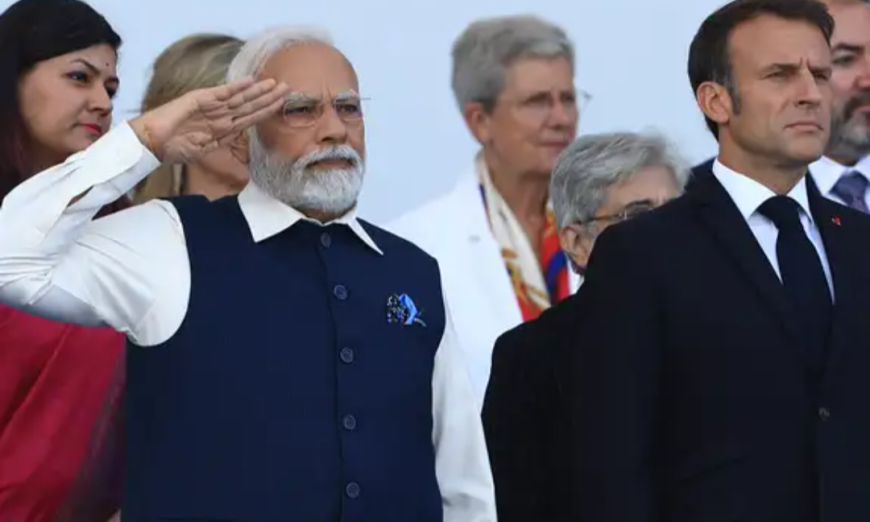Indian Prime Minister Narendra Modi was the guest of honor at France’s traditional Bastille Day parade, reflecting growing strategic ties between the two nations.
India’s Prime Minister Narendra Modi is visiting France to attend the country’s annual July 14 Bastille Day national festival as guest of honor.
The visit comes at a significant moment, as the two countries celebrate 25 years of their strategic partnership marked by civil nuclear, space and defense cooperation.
In recent years, the partnership has expanded to areas such as energy and countering cyberterrorism. The office of French President Emmanuel Macron has said Modi’s presence and the participation of Indian forces in the Bastille Day parade would mark a “new phase in the strategic relationship.”
“India and France have consistently been strong partners. It’s a historical relationship that stretches back decades, precedes Modi and is much deeper than just business ties,” said Jean-Luc Racine, senior fellow at the Center for South Asian Studies in Paris. “It has a hugely important defense and security dimension.”
That refers to deepening naval and security cooperation between Paris and New Delhi in the Indo-Pacific, where France has a string of islands and a vast maritime exclusive economic zone. The relationship is mainly driven by shared concerns about China’s rising influence in the region.
France is also India’s second-largest weapons supplier after Russia, and the war in Ukraine has prompted New Delhi to accelerate its efforts to diversify its sources of military gear away from Moscow.
Reports suggest Modi’s visit could see the two countries announce new deals for the naval version of French Rafale fighter jets, which are tailored for use on aircraft carriers, and three Scorpene-class submarines.
‘Inevitable nature’ of India-France ties.
Some analysts point out that the global context of Modi’s visit to France is just as important.
India is chairing the Group of 20 (G20) — a club of the world’s leading advanced and emerging economies — this year and Modi, who has deftly balanced ties with both the West and Russia, is courted by all sides despite not condemning the Russian invasion of Ukraine and boosting oil imports from Moscow.
In many ways, France sees India as the perfect ally to bridge the divisions revealed and amplified by the Russian military aggression.
In a briefing this week, the Elysee Palace spoke of the “inevitable nature” of the partnership with India, which it said is now the world’s fifth-largest economy and France’s second-largest economic partner in Asia.
“There’s a high degree of trust and comfort level between India and France and ideological convergences. Both countries highly value an independent line of action and thinking,” Harsh Pant, from the New Delhi-based think tank Observer Research Foundation, said.
“The way India has positioned itself, its diplomacy and its global outreach, there is a sense that India represents a large number of countries whose voices are not being heard on existential issues like rising, food, fertilizer and energy prices as a result of the war,” he said.
“India could help France and the West to reach out to a large part of the world where there is a seeming disconnect right now.”

